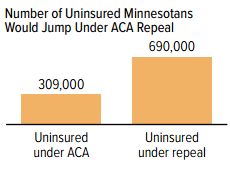Without health insurance, broken legs or difficult diagnoses can lead to shattered finances and force families to choose between their health and their other basic necessities. Minnesota is a national leader when it comes to access to affordable health insurance. We recently learned that fewer than one in five Minnesotans lack health insurance. But all of our progress faces a grave risk as federal policymakers make plans to roll back the gains made possible by the Affordable Care Act (ACA).
Since the full implementation of the ACA began in 2014, the number of uninsured Minnesotans has dropped by 44 percent. Insurers can no longer deny coverage based on someone’s pre-existing conditions. Important protections were put in place to ensure that health care plans don’t discriminate based on gender and offer essential health benefits.
The health care market remains far from perfect, but repealing the ACA would be a step in the wrong direction. If the new Congress passes something like the ACA repeals they’ve considered in the past, there will be drastic consequences for Minnesotans’ ability to find coverage. National analyses conclude that most of the health insurance coverage losses would occur among working families and people without college degrees, and those with chronic conditions or past illnesses are likely to have the hardest time finding affordable health insurance. According to analysis by the Urban Institute, repealing the ACA would:

- Increase the number of uninsured Minnesotans to 690,000 in 2019 — leaving the state with more than double the number of currently uninsured people, and roughly 250,000 more uninsured people than before the ACA rolled out in full.
- Eliminate $16.4 billion in federal dollars to Minnesota between 2019 and 2028 that would have supported efforts to provide affordable health insurance options in the state.
- Destabilize the individual insurance market, leaving Minnesotans who don’t have employer-provided insurance without good options for coverage. The Minnesotans who need insurance the most would likely be hit the hardest.
No family should have to choose between paying their health insurance premium or their rent. The ACA moved us closer to that goal; policymakers should be focusing on ways to build on that past success. By threatening to remove the protections and undo the gains of the ACA without providing any concrete alternatives, federal policymakers are not simply turning back the clock. They are writing Minnesota a prescription for an even worse health insurance landscape than the one that we left behind years ago.
By Ben Horowitz